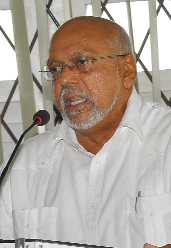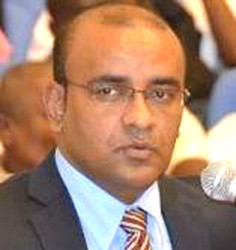Former presidents Bharrat Jagdeo and Donald Ramotar have filed separate legal challenges to a law enacted earlier this year to cap their benefits as former heads of state.
Through their attorney Murseline Bacchus, Jagdeo and Ramotar are asking the court to declare that the Former Presidents (Bene-fits and other facilities) Act 2015 does not retroactively affect their entitlements.
They are also seeking declarations that the Form-er Presidents (Benefits and Other facilities) Act 2009, which was repealed, vested property rights in them that became absolute when they demitted office and that they are entitled to receive their entitled benefits within a reasonable time after leaving office. They also seek an order compelling the Finance Minister and/or the Commissioner-General of the Guyana Revenue Authority and/or their agents to immediately provide the financial benefits conferred by the old law.
Attorney-General Basil Williams yesterday announced the lawsuits during a press conference at his Carmichael Street office, while saying that they were seeking “large sums of money in benefits and other facilities” that were capped by the new Act.
Reading from a prepared statement, Williams informed that Jagdeo and Ramator filed their applications in the High Court of November 11 and the matters come up before acting Chief Justice Ian Chang and Justice Narendra Singh, respectively, on December 11. At that point, he noted, the Attorney-General’s Chambers would seek leave to defend the applications.



“They are now challenging the Act… and contend that their earnings had accrued before the passage of the Act and so they are entitled to continue to be able to receive those tremendous earnings and benefits still,” Williams noted.
“If you recall in the parliamentary debate, the figures that were read out that were in fact incurred by President Jagdeo, for example, were enormous and the question is whether in light of the pension that he was enjoying and other facilities whether this country could have afforded to have a (former) president… his travel was hundreds of thousands of dollars. Those things were ventilated in the Parliament,” Williams said, while questioning why neither the PPP/C nor the former presidents had informed the public about the court actions.
The notice of motions and supporting affidavits seen by Stabroek News state that the new Act does not “retrospectively affect” the benefits of either Jagdeo or Ramotar as they had demitted office prior to its coming into operation. Jagdeo demitted office on December 3, 2011, while Ramotar ceased being president on May 16, 2015.
Both Jagdeo and Ramotar say that they believe that the 2015 Act will be used to deny the benefits which have been conferred upon them in the 2009 Act and that any attempt to do so “will be unlawful, unconstitutional, null, void and of no effect” and an attempt to violate their constitutional rights under Article 142 of the Constitution. They further contend that their rights under the old Act and Article 142 of the Constitution, which provides protection against the deprivation of property, are being or are likely to be contravened by the new law.
Among the benefits a former president was entitled to under the old Act are payment of utility bills, free medical treatment and reimbursement for himself and dependent family members, full time personal security, annual vacation allowance and the service of personal and household staff including an attendant and a gardener. The benefits were enacted by the Jagdeo-led PPP/C administration in 2009 and were defended by Ramotar in 2013, when he vetoed a similar bill passed by the then opposition to cap benefits.
In July, the new coalition government, within months of taking office, passed the new law to scale back the controversial benefits package for former presidents, which it had described as “vulgar.” The APNU+AFC’s position was that the capping of the package was a step in the direction of cutting waste and unnecessary expenditure.
Under the new Act, the allowances allocated for water, telephone and electricity were capped at $75,000 per month compared to the uncapped amount that averaged $370,000 a month for Jagdeo. Additionally, the Act stipulates that all benefits and facilities granted are subject to taxation.
The Act does not affect the $1.4 million monthly pension that former presidents receive. However, under the new legislation household staff are limited to three persons; security personnel are limited to two persons; and clerical or technical staff are limited to three persons who must not be engaged in any political work. The Act also limits a former president to two vehicles to be owned and maintained by the State.
At the time of the passage of the bill, the PPP/C parliamentarians were not present as up to that point they had refused to take up their seats in the House. President David Granger would have assented to the bill shortly after its July 9 passage.
In February this year, a private citizen filed court proceedings to protect Jagdeo’s benefits. Colin Pilgrim, a Charlestown resident, had filed a motion seeking several orders, including one for the issuing of the requisite regulations under the Act to permit Jagdeo to tap a broad range of benefits. The seeking of the order suggested that Jagdeo had not accessed all of benefits enshrined in the old Act.




